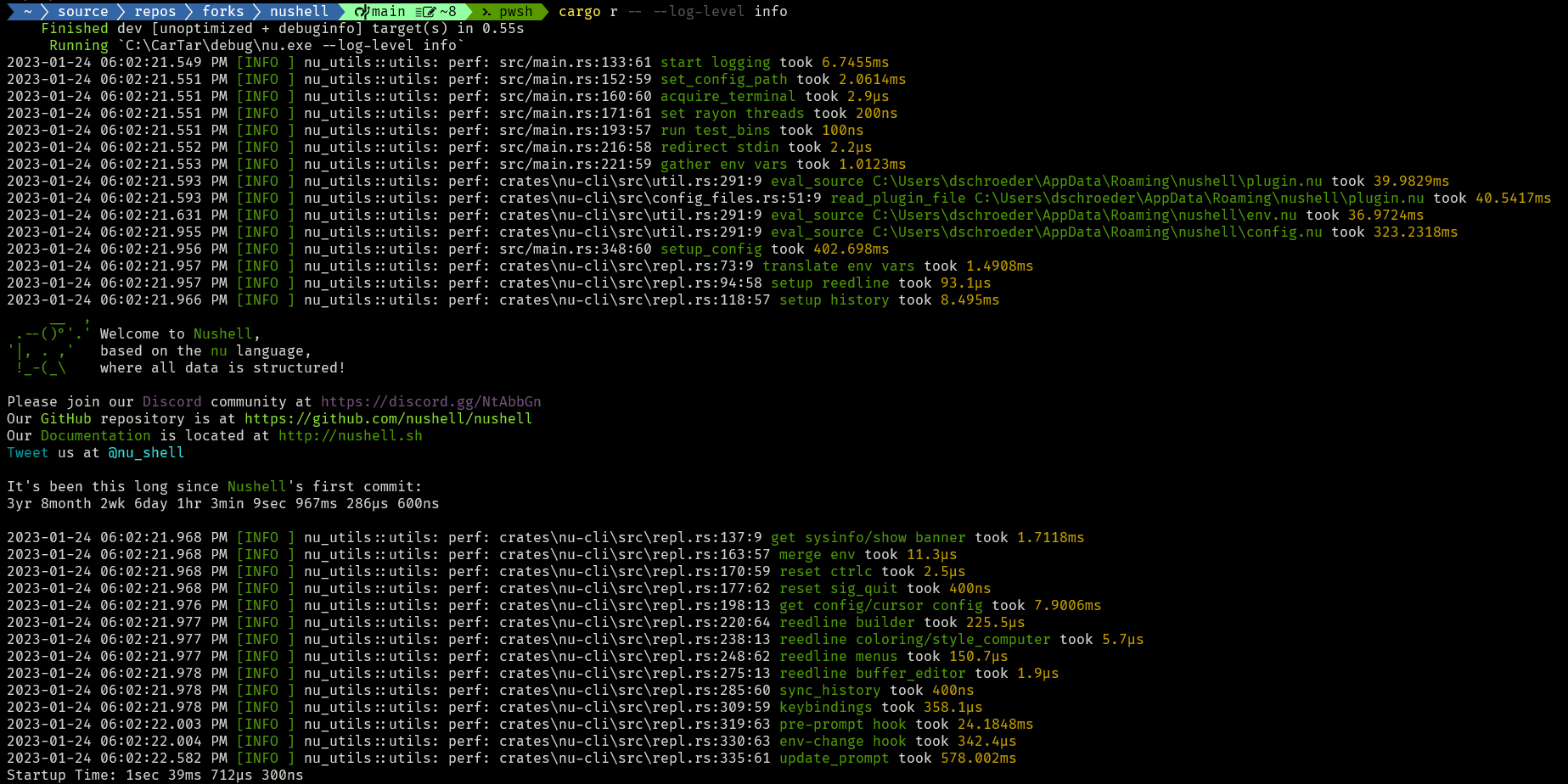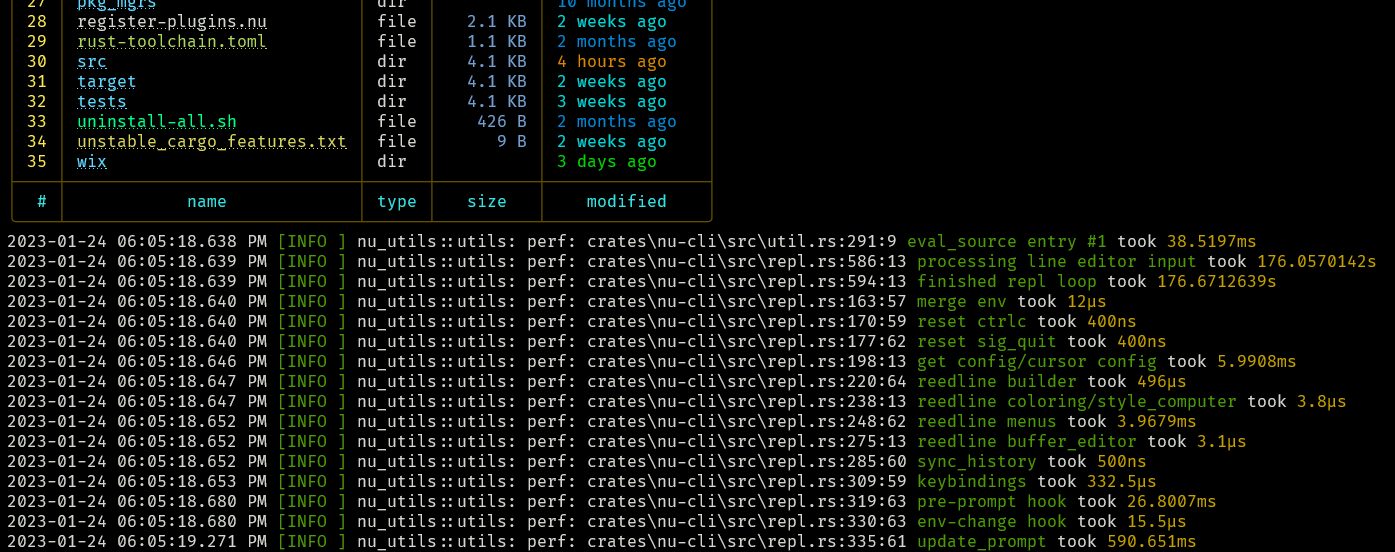mirror of
https://github.com/nushell/nushell.git
synced 2025-05-30 06:39:33 +02:00
# Description This PR changes the old performance logging with `Instant` timers. I'm not sure if this is the best way to do it but it does help reveal where time is being spent on startup. This is what it looks like when you launch nushell with `cargo run -- --log-level info`. I'm using the `info` log level exclusively for performance monitoring at this point.  ## After Startup Since you're in the repl, you can continue running commands. Here's the output of `ls`, for instance.  Note that the above screenshots are in debug mode, so they're much slower than release. # User-Facing Changes # Tests + Formatting Don't forget to add tests that cover your changes. Make sure you've run and fixed any issues with these commands: - `cargo fmt --all -- --check` to check standard code formatting (`cargo fmt --all` applies these changes) - `cargo clippy --workspace -- -D warnings -D clippy::unwrap_used -A clippy::needless_collect` to check that you're using the standard code style - `cargo test --workspace` to check that all tests pass # After Submitting If your PR had any user-facing changes, update [the documentation](https://github.com/nushell/nushell.github.io) after the PR is merged, if necessary. This will help us keep the docs up to date.
378 lines
12 KiB
Rust
378 lines
12 KiB
Rust
use crate::repl::eval_hook;
|
|
use nu_engine::eval_block;
|
|
use nu_parser::{escape_quote_string, lex, parse, unescape_unquote_string, Token, TokenContents};
|
|
use nu_protocol::engine::StateWorkingSet;
|
|
use nu_protocol::CliError;
|
|
use nu_protocol::{
|
|
engine::{EngineState, Stack},
|
|
print_if_stream, PipelineData, ShellError, Span, Value,
|
|
};
|
|
#[cfg(windows)]
|
|
use nu_utils::enable_vt_processing;
|
|
use nu_utils::utils::perf;
|
|
use std::path::{Path, PathBuf};
|
|
|
|
// This will collect environment variables from std::env and adds them to a stack.
|
|
//
|
|
// In order to ensure the values have spans, it first creates a dummy file, writes the collected
|
|
// env vars into it (in a "NAME"="value" format, quite similar to the output of the Unix 'env'
|
|
// tool), then uses the file to get the spans. The file stays in memory, no filesystem IO is done.
|
|
//
|
|
// The "PWD" env value will be forced to `init_cwd`.
|
|
// The reason to use `init_cwd`:
|
|
//
|
|
// While gathering parent env vars, the parent `PWD` may not be the same as `current working directory`.
|
|
// Consider to the following command as the case (assume we execute command inside `/tmp`):
|
|
//
|
|
// tmux split-window -v -c "#{pane_current_path}"
|
|
//
|
|
// Here nu execute external command `tmux`, and tmux starts a new `nushell`, with `init_cwd` value "#{pane_current_path}".
|
|
// But at the same time `PWD` still remains to be `/tmp`.
|
|
//
|
|
// In this scenario, the new `nushell`'s PWD should be "#{pane_current_path}" rather init_cwd.
|
|
pub fn gather_parent_env_vars(engine_state: &mut EngineState, init_cwd: &Path) {
|
|
gather_env_vars(std::env::vars(), engine_state, init_cwd);
|
|
}
|
|
|
|
fn gather_env_vars(
|
|
vars: impl Iterator<Item = (String, String)>,
|
|
engine_state: &mut EngineState,
|
|
init_cwd: &Path,
|
|
) {
|
|
fn report_capture_error(engine_state: &EngineState, env_str: &str, msg: &str) {
|
|
let working_set = StateWorkingSet::new(engine_state);
|
|
report_error(
|
|
&working_set,
|
|
&ShellError::GenericError(
|
|
format!("Environment variable was not captured: {}", env_str),
|
|
"".to_string(),
|
|
None,
|
|
Some(msg.into()),
|
|
Vec::new(),
|
|
),
|
|
);
|
|
}
|
|
|
|
fn put_env_to_fake_file(name: &str, val: &str, fake_env_file: &mut String) {
|
|
fake_env_file.push_str(&escape_quote_string(name));
|
|
fake_env_file.push('=');
|
|
fake_env_file.push_str(&escape_quote_string(val));
|
|
fake_env_file.push('\n');
|
|
}
|
|
|
|
let mut fake_env_file = String::new();
|
|
// Write all the env vars into a fake file
|
|
for (name, val) in vars {
|
|
put_env_to_fake_file(&name, &val, &mut fake_env_file);
|
|
}
|
|
|
|
match init_cwd.to_str() {
|
|
Some(cwd) => {
|
|
put_env_to_fake_file("PWD", cwd, &mut fake_env_file);
|
|
}
|
|
None => {
|
|
// Could not capture current working directory
|
|
let working_set = StateWorkingSet::new(engine_state);
|
|
report_error(
|
|
&working_set,
|
|
&ShellError::GenericError(
|
|
"Current directory is not a valid utf-8 path".to_string(),
|
|
"".to_string(),
|
|
None,
|
|
Some(format!(
|
|
"Retrieving current directory failed: {:?} not a valid utf-8 path",
|
|
init_cwd
|
|
)),
|
|
Vec::new(),
|
|
),
|
|
);
|
|
}
|
|
}
|
|
|
|
// Lex the fake file, assign spans to all environment variables and add them
|
|
// to stack
|
|
let span_offset = engine_state.next_span_start();
|
|
|
|
engine_state.add_file(
|
|
"Host Environment Variables".to_string(),
|
|
fake_env_file.as_bytes().to_vec(),
|
|
);
|
|
|
|
let (tokens, _) = lex(fake_env_file.as_bytes(), span_offset, &[], &[], true);
|
|
|
|
for token in tokens {
|
|
if let Token {
|
|
contents: TokenContents::Item,
|
|
span: full_span,
|
|
} = token
|
|
{
|
|
let contents = engine_state.get_span_contents(&full_span);
|
|
let (parts, _) = lex(contents, full_span.start, &[], &[b'='], true);
|
|
|
|
let name = if let Some(Token {
|
|
contents: TokenContents::Item,
|
|
span,
|
|
}) = parts.get(0)
|
|
{
|
|
let bytes = engine_state.get_span_contents(span);
|
|
|
|
if bytes.len() < 2 {
|
|
report_capture_error(
|
|
engine_state,
|
|
&String::from_utf8_lossy(contents),
|
|
"Got empty name.",
|
|
);
|
|
|
|
continue;
|
|
}
|
|
|
|
let (bytes, parse_error) = unescape_unquote_string(bytes, *span);
|
|
|
|
if parse_error.is_some() {
|
|
report_capture_error(
|
|
engine_state,
|
|
&String::from_utf8_lossy(contents),
|
|
"Got unparsable name.",
|
|
);
|
|
|
|
continue;
|
|
}
|
|
|
|
bytes
|
|
} else {
|
|
report_capture_error(
|
|
engine_state,
|
|
&String::from_utf8_lossy(contents),
|
|
"Got empty name.",
|
|
);
|
|
|
|
continue;
|
|
};
|
|
|
|
let value = if let Some(Token {
|
|
contents: TokenContents::Item,
|
|
span,
|
|
}) = parts.get(2)
|
|
{
|
|
let bytes = engine_state.get_span_contents(span);
|
|
|
|
if bytes.len() < 2 {
|
|
report_capture_error(
|
|
engine_state,
|
|
&String::from_utf8_lossy(contents),
|
|
"Got empty value.",
|
|
);
|
|
|
|
continue;
|
|
}
|
|
|
|
let (bytes, parse_error) = unescape_unquote_string(bytes, *span);
|
|
|
|
if parse_error.is_some() {
|
|
report_capture_error(
|
|
engine_state,
|
|
&String::from_utf8_lossy(contents),
|
|
"Got unparsable value.",
|
|
);
|
|
|
|
continue;
|
|
}
|
|
|
|
Value::String {
|
|
val: bytes,
|
|
span: *span,
|
|
}
|
|
} else {
|
|
report_capture_error(
|
|
engine_state,
|
|
&String::from_utf8_lossy(contents),
|
|
"Got empty value.",
|
|
);
|
|
|
|
continue;
|
|
};
|
|
|
|
// stack.add_env_var(name, value);
|
|
engine_state.add_env_var(name, value);
|
|
}
|
|
}
|
|
}
|
|
|
|
pub fn eval_source(
|
|
engine_state: &mut EngineState,
|
|
stack: &mut Stack,
|
|
source: &[u8],
|
|
fname: &str,
|
|
input: PipelineData,
|
|
) -> bool {
|
|
let start_time = std::time::Instant::now();
|
|
|
|
let (block, delta) = {
|
|
let mut working_set = StateWorkingSet::new(engine_state);
|
|
let (output, err) = parse(
|
|
&mut working_set,
|
|
Some(fname), // format!("entry #{}", entry_num)
|
|
source,
|
|
false,
|
|
&[],
|
|
);
|
|
if let Some(err) = err {
|
|
set_last_exit_code(stack, 1);
|
|
report_error(&working_set, &err);
|
|
return false;
|
|
}
|
|
|
|
(output, working_set.render())
|
|
};
|
|
|
|
if let Err(err) = engine_state.merge_delta(delta) {
|
|
set_last_exit_code(stack, 1);
|
|
report_error_new(engine_state, &err);
|
|
return false;
|
|
}
|
|
|
|
match eval_block(engine_state, stack, &block, input, false, false) {
|
|
Ok(pipeline_data) => {
|
|
let config = engine_state.get_config();
|
|
let result;
|
|
if let PipelineData::ExternalStream {
|
|
stdout: stream,
|
|
stderr: stderr_stream,
|
|
exit_code,
|
|
..
|
|
} = pipeline_data
|
|
{
|
|
result = print_if_stream(stream, stderr_stream, false, exit_code);
|
|
} else if let Some(hook) = config.hooks.display_output.clone() {
|
|
match eval_hook(engine_state, stack, Some(pipeline_data), vec![], &hook) {
|
|
Err(err) => {
|
|
result = Err(err);
|
|
}
|
|
Ok(val) => {
|
|
result = val.print(engine_state, stack, false, false);
|
|
}
|
|
}
|
|
} else {
|
|
result = pipeline_data.print(engine_state, stack, true, false);
|
|
}
|
|
|
|
match result {
|
|
Err(err) => {
|
|
let working_set = StateWorkingSet::new(engine_state);
|
|
|
|
report_error(&working_set, &err);
|
|
|
|
return false;
|
|
}
|
|
Ok(exit_code) => {
|
|
set_last_exit_code(stack, exit_code);
|
|
}
|
|
}
|
|
|
|
// reset vt processing, aka ansi because illbehaved externals can break it
|
|
#[cfg(windows)]
|
|
{
|
|
let _ = enable_vt_processing();
|
|
}
|
|
}
|
|
Err(err) => {
|
|
set_last_exit_code(stack, 1);
|
|
|
|
let working_set = StateWorkingSet::new(engine_state);
|
|
|
|
report_error(&working_set, &err);
|
|
|
|
return false;
|
|
}
|
|
}
|
|
perf(
|
|
&format!("eval_source {}", &fname),
|
|
start_time,
|
|
file!(),
|
|
line!(),
|
|
column!(),
|
|
);
|
|
|
|
true
|
|
}
|
|
|
|
fn set_last_exit_code(stack: &mut Stack, exit_code: i64) {
|
|
stack.add_env_var(
|
|
"LAST_EXIT_CODE".to_string(),
|
|
Value::int(exit_code, Span::unknown()),
|
|
);
|
|
}
|
|
|
|
pub fn report_error(
|
|
working_set: &StateWorkingSet,
|
|
error: &(dyn miette::Diagnostic + Send + Sync + 'static),
|
|
) {
|
|
eprintln!("Error: {:?}", CliError(error, working_set));
|
|
// reset vt processing, aka ansi because illbehaved externals can break it
|
|
#[cfg(windows)]
|
|
{
|
|
let _ = nu_utils::enable_vt_processing();
|
|
}
|
|
}
|
|
|
|
pub fn report_error_new(
|
|
engine_state: &EngineState,
|
|
error: &(dyn miette::Diagnostic + Send + Sync + 'static),
|
|
) {
|
|
let working_set = StateWorkingSet::new(engine_state);
|
|
|
|
report_error(&working_set, error);
|
|
}
|
|
|
|
pub fn get_init_cwd() -> PathBuf {
|
|
std::env::current_dir().unwrap_or_else(|_| {
|
|
std::env::var("PWD")
|
|
.map(Into::into)
|
|
.unwrap_or_else(|_| nu_path::home_dir().unwrap_or_default())
|
|
})
|
|
}
|
|
|
|
pub fn get_guaranteed_cwd(engine_state: &EngineState, stack: &Stack) -> PathBuf {
|
|
nu_engine::env::current_dir(engine_state, stack).unwrap_or_else(|e| {
|
|
let working_set = StateWorkingSet::new(engine_state);
|
|
report_error(&working_set, &e);
|
|
get_init_cwd()
|
|
})
|
|
}
|
|
|
|
#[cfg(test)]
|
|
mod test {
|
|
use super::*;
|
|
|
|
#[test]
|
|
fn test_gather_env_vars() {
|
|
let mut engine_state = EngineState::new();
|
|
let symbols = r##" !"#$%&'()*+,-./:;<=>?@[\]^_`{|}~"##;
|
|
|
|
gather_env_vars(
|
|
[
|
|
("FOO".into(), "foo".into()),
|
|
("SYMBOLS".into(), symbols.into()),
|
|
(symbols.into(), "symbols".into()),
|
|
]
|
|
.into_iter(),
|
|
&mut engine_state,
|
|
Path::new("t"),
|
|
);
|
|
|
|
let env = engine_state.render_env_vars();
|
|
|
|
assert!(
|
|
matches!(env.get(&"FOO".to_string()), Some(&Value::String { val, .. }) if val == "foo")
|
|
);
|
|
assert!(
|
|
matches!(env.get(&"SYMBOLS".to_string()), Some(&Value::String { val, .. }) if val == symbols)
|
|
);
|
|
assert!(
|
|
matches!(env.get(&symbols.to_string()), Some(&Value::String { val, .. }) if val == "symbols")
|
|
);
|
|
assert!(env.get(&"PWD".to_string()).is_some());
|
|
assert_eq!(env.len(), 4);
|
|
}
|
|
}
|